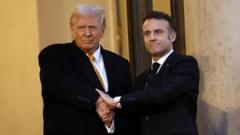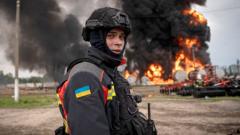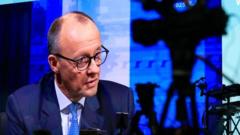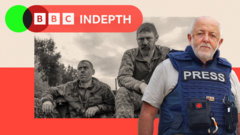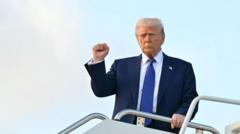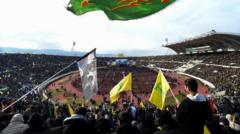**In a surprising turn, Russian leadership refrains from commemorative events, reflecting the complexities and challenges facing the nation after three years of conflict.**
**Silence Marks Anniversary of Ukraine Conflict in Russia**

**Silence Marks Anniversary of Ukraine Conflict in Russia**
**Amidst the three-year milestone, Russian officials demonstrate an understated response to the ongoing war with Ukraine.**
In a stark display of silence, Russian officials avoided public commemorations on the anniversary of the full-scale invasion of Ukraine, initiated by President Vladimir V. Putin three years ago. Unlike previous years filled with speeches and memorials, this year saw no such events, with the day marked only by routine reports on state television, which conspicuously lacked mention of the anniversary's significance.
On the morning of February 24, 2025, citizens in Moscow visited Red Square, devoid of commemorative activities. President Putin did not schedule any public appearances to reflect on the conflict, which has evolved into Europe’s largest military confrontation since World War II. Notably absent were the usual proclamations from local officials, who often align with the Kremlin’s narrative that celebrates Russian military involvement in Ukraine.
Public mourning for Russian casualties, estimated by U.S. intelligence to number in the hundreds of thousands, was also conspicuously absent on Monday. An independent report by exiled journalists indicated that Russia's military losses have exceeded 165,000, although these figures remain unverified due to the Russian defense ministry's ongoing refusal to publish official casualty statistics.
Adding an unexpected twist, Sergei A. Ryabkov, a deputy foreign minister, chose not to address the anniversary directly but praised former President Trump's administration for attempting to foster closer ties with Russia. He cautioned against pursuing only a ceasefire without addressing the underlying issues fueling the conflict, hinting at the necessity for a more comprehensive long-term resolution. His comments came after a recent meeting between U.S. and Russian officials, which marked the first dialogue in three years.
The silence from the Kremlin on this significant anniversary raises questions about the current state of Russian sentiment regarding the ongoing war. As the conflict continues to unfold, the lack of public acknowledgment may signal a broader struggle within the nation as it grapples with the realities of military engagement and its implications for international relations.
On the morning of February 24, 2025, citizens in Moscow visited Red Square, devoid of commemorative activities. President Putin did not schedule any public appearances to reflect on the conflict, which has evolved into Europe’s largest military confrontation since World War II. Notably absent were the usual proclamations from local officials, who often align with the Kremlin’s narrative that celebrates Russian military involvement in Ukraine.
Public mourning for Russian casualties, estimated by U.S. intelligence to number in the hundreds of thousands, was also conspicuously absent on Monday. An independent report by exiled journalists indicated that Russia's military losses have exceeded 165,000, although these figures remain unverified due to the Russian defense ministry's ongoing refusal to publish official casualty statistics.
Adding an unexpected twist, Sergei A. Ryabkov, a deputy foreign minister, chose not to address the anniversary directly but praised former President Trump's administration for attempting to foster closer ties with Russia. He cautioned against pursuing only a ceasefire without addressing the underlying issues fueling the conflict, hinting at the necessity for a more comprehensive long-term resolution. His comments came after a recent meeting between U.S. and Russian officials, which marked the first dialogue in three years.
The silence from the Kremlin on this significant anniversary raises questions about the current state of Russian sentiment regarding the ongoing war. As the conflict continues to unfold, the lack of public acknowledgment may signal a broader struggle within the nation as it grapples with the realities of military engagement and its implications for international relations.


